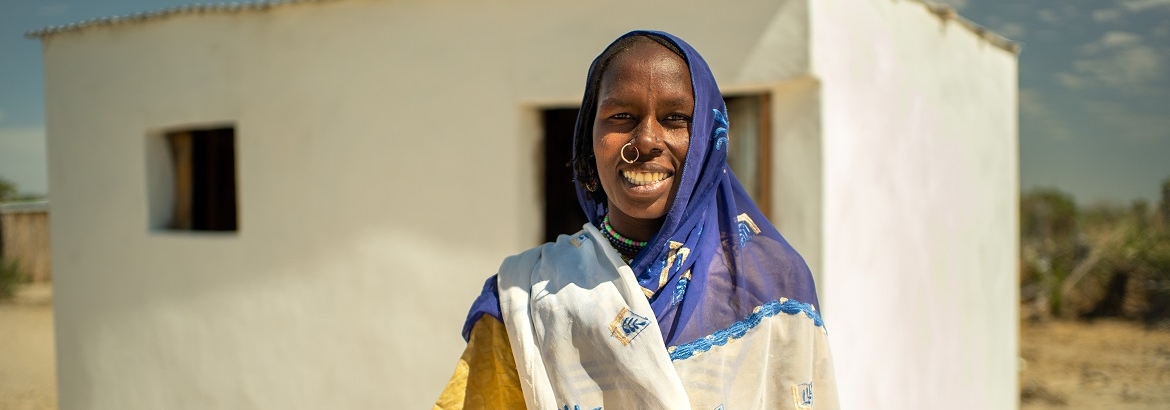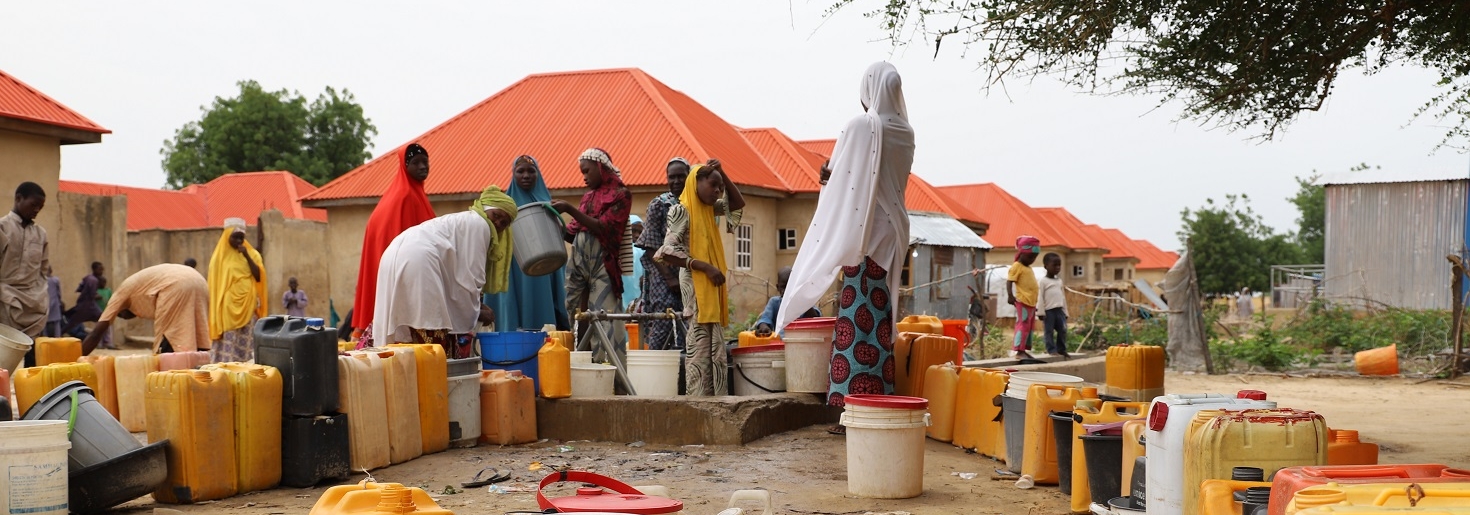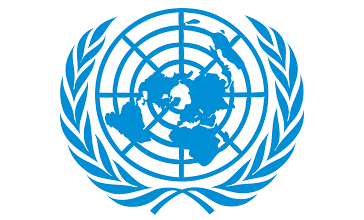IOM Vision
IOM’s engagement in the four riparian states of the Lake Chad Basin, namely Cameroon, Chad, Niger, and Nigeria, aims to directly supports the Lake Chad Basin Commission (LCBC), central and local level authorities in the implementation of interventions spanning across the humanitarian-development-peace nexus (HDPN). In alignment with the LCBC’s Regional Strategy for the Stabilization, Recovery, and Resilience of the areas of the Lake Chad Basin region impacted by crises, IOM supports the LCBC and its Member States to provide humanitarian assistance to displaced populations, prevent and reduce conflict drivers, and support the attainment of durable solutions for conflict-affected populations.
Objective
Saving lives and protecting people on the move
In order to alleviate suffering of conflict-affected populations, and ensure that lifesaving humanitarian needs are met, IOM assists internally displaced persons (IDPs), refugees and host communities in areas of displacement throughout the Lake Chad Basin region.
|
IOM will continue to provide tailored shelter/non-food item (NFI) assistance to the most vulnerable IDPs displaced by the Lake Chad Basin crisis, IDPs returning to areas of origin and vulnerable host communities to address urgent needs and alleviate suffering, including through:
Interventions will be in line with the shelter/NFI cluster guidelines and Sphere standards in all four affected countries, and the target population (IDPs in sites, collective centres, in host communities as well as vulnerable host communities) will be selected through transparent processes adapted to the local context and relevant vulnerability criteria with a particular attention to gender balance. |
|
Following IOM’s Manual on Community-Based Mental Health and Psychosocial Support in Emergencies and Displacement, the Organization will target displaced and host communities affected by the Lake Chad Basin crisis. This will include:
IOM will continue to ensure that standards set for instance by the IASC Reference Group on MHPSS in Emergency Settings and internationally recommended procedures are followed, responses are coordinated, respectfully of IOM’s data protection principles and that a common understanding is established among MHPSS partners on MHPSS concepts and terms, principles and models of work, community-based approaches and information sharing in the Far North of Cameroon and North-East Nigeria, where IOM leads the MHPSS response. |
|
IOM will continue to provide safe access to sufficient water, sanitation and hygiene services in Borno, Yobe and Adamawa states in Nigeria, as well as in the Diffa region in Niger. This will include:
Priority areas of intervention include host communities with large groups of displaced households and camps, particularly congested-camps and camps with low accessibility of WASH services, camp-like sites, host communities around settlements without WASH services, and reception centres. |
|
IOM will continue to work with the Ministries of Health and health sector partners in Chad, Niger and Nigeria to provide systematic approaches to enhancing healthcare provision in camp and camp-like settings. This will include:
|
|
IOM supports its Member States to augment national and local capacity to mitigate protection concerns, including through:
|
|
IOM’s proposed response in camp coordination and camp management (CCCM) in Chad, Niger and Nigeria will be aimed at displaced households settled in formal camps, spontaneous sites and collective centers as well as large groups of IDPs living in host communities and urban centers that could benefit from the services. IOM plans to:
|

Objective
Driving solutions to displacement
|
IDPs and refugees are beginning to return to areas of origin and underlining the need to support localized efforts to transition back into normalcy and attain durable solutions, IOM supports humanitarian, recovery, and governance efforts in areas of displacement and return of conflict-affected persons, including returnees, IDPs seeking shelter in newly-safe areas and communities who stayed behind. |
In its effort to support strengthened local governance, community resilience and social cohesion, IOM supports local authorities through capacity building and infrastructure rehabilitation to enable the provision of basic services to their communities.
|
IOM engages its Member States at national and local levels to contribute to the recovery and resilience-building of conflict-affected populations throughout the Lake Chad Basin through community stabilization interventions in order to enhance stability and security, restore access to effective local governance structures and mechanisms, rebuild trust and social cohesion among community members, vulnerable populations and local authorities, and lay the foundations for durable solutions, lasting peace and sustainable development. Aligned with the objectives of the RSS, IOM’s strategy to reinforcing stability engages conflict-affected communities and local authorities in transparent, participatory processes to jointly and constructively discuss community grievances, and identify solutions contributing to local recovery and social cohesion. In doing so, IOM employs a two-pronged approach which includes:
|
|
As displaced populations continue to return to their places of origin, there is an urgent need to support recovery efforts and build community resilience to address the factors of displacement. Through Progressive Resolution of Displacement Situations framework, IOM operates in areas of return deemed conducive to longer-term sustainable recovery by working to promote socio-economic recovery, including through support to social cohesion, local governance restoration, and through renewing access to livelihoods and to greater economic opportunities. Activities will include:
|
|
To promote peace in the Lake Chad Basin region, IOM will support the transitioning of communities out of conflict, notably through community-based conflict management, providing support to community reconciliation processes intended to mitigate the drivers of conflict. Activities will target the most vulnerable youth while building their sense of purpose. Interventions will include:
|
Objective
Strengthen preparedness and reduce disaster risk
|
IOM will support national and local authorities to reinforce preparedness and disaster risk reduction and will assist those communities most-at-risk of natural disasters and disease outbreaks. |
|
In line with the Sendai Framework for Disaster Risk Reduction (DRR) 2015–2030 and underpinned by broad multi-stakeholder engagement, IOM’s disaster risk reduction (DRR) efforts in the region will include:
|
|
IOM will increase its preparedness efforts in all countries as well as support authorities and communities, through:
|
IOM will continue to work with the Ministries of Health and relevant border management authorities to support the prevention, protection against, and control of the spread of diseases, including COVID-19, through:
- Supporting surveillance at points of entry and the implementation of the International Health Regulations (2005).
Objective
Contribute to an evidence-based and efficient crisis response system
|
Actors engaged in the Lake Chad Basin crisis response across the humanitarian-development-peace nexus. |
|
IOM’s Displacement Tracking Matrix continues to serve as a critical data source on displacements across the Lake Chad Basin for governments, and national and international partners alike. Through regular collection, analysis and dissemination of data on displacements and stability, the DTM continues providing key stakeholders with essential understanding of population movements, trends over time, and the evolving needs of conflict-affected populations across the Lake Chad Basin. Across the Lake Chad Basin countries, IOM supports collective evidence-based decisions-making through its implementation of the following data collection exercises:
In order to ensure greater support to the Lake Chad Basin Commission in its efforts across the humanitarian-development nexus to address needs and end displacement, IOM will further engage with governmental counterparts to ensure capacity transfer and appropriation on specific data collection activities conducted for several years in the Lake Chad Basin region. |
Nigeria, Niger, Cameroon, Chad
The map used here is for illustration purposes only. Names and boundaries do not imply official endorsement or acceptance by IOM.
Figures are as of 31 December 2023. For more details of IOM's operational capacity in country, please see the IOM Capacity section.





















